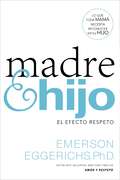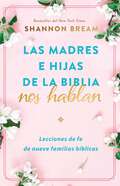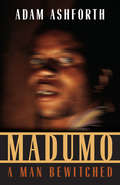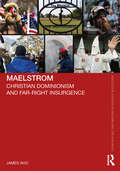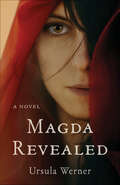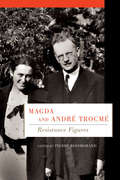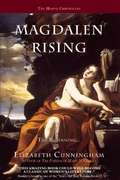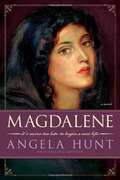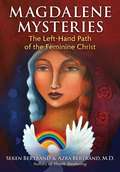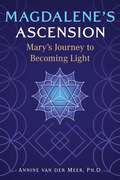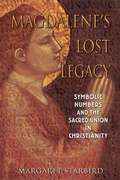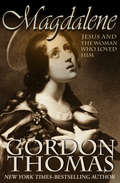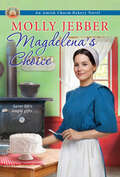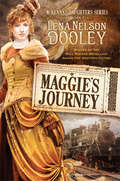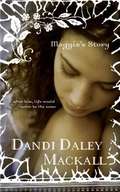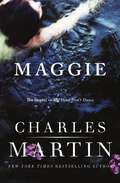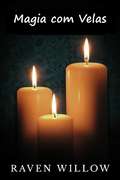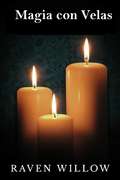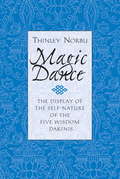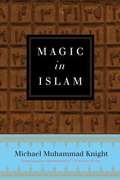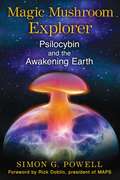- Table View
- List View
Madre e hijo: El efecto respeto
by Dr Emerson EggerichsEl amor es importante, pero el respeto es la clave al corazón de tu hijo. La idea de que las mamás respeten a sus hijos puede sonar ajena para algunos, pero también parece encender curiosidad. Es fácil identificarse con la necesidad que todos sentimos del amor de una madre, pero ¿es eso lo mismo que respeto? Incluso para los niños pequeños, el efecto del respeto no es nada menos que asombroso cuando se aplica apropiadamente. Las mamás desean aprender cualquier cosa que les ayude con sus hijos. Después de todo, aman a sus hijos, pero a muchas de ellas les resulta más difícil criarlos que a las niñas, especialmente desde los cuatro años de edad en adelante. Lo que hace que todo esto sea más urgente es que las mamás están entrenando a los padres para amar a sus hijas, pero nadie ha dicho nada a las mamás sobre cómo mostrar respeto a sus hijos, al menos no de una forma que sea aplicable y completamente explicada. Todos entienden que las niñas pequeñas necesitan el amor de papá, pero ¿quién está promocionando con fuerza la verdad de que los niños pequeños (y los grandes) necesitan el respeto de mamá? No es extraño que las madres sientan que no saben nada sobre este tema. Al igual que Emerson Eggerichs transformó millones de relaciones matrimoniales con un entendimiento bíblico del amor y el respeto, ahora dirige esos principios a una de las relaciones más importantes de todas: una madre y su hijo.
Madres e hijas de la Biblia hablan / The Mothers and Daughters of the Bible Speak
by Shannon BreamPara las madres y mujeres de fe que no se sienten suficientemente virtuosas o diligentes, para las personas agobiadas por sus errores e incluso para quienes piensan que han fallado, este es un libro poderoso y tranquilizador que examina cómo las mujeres de la Biblia se enfrentaron a escenarios y problemas similares a los que experimenta la mujer de hoy, a la vez que ofrece reflexiones necesarias para ayudarnos a comprender mejor las lecciones que sus vidas tienen para nosotros.En general, las historias bíblicas protagonizadas por hombres se han utilizado frecuentemente, y por largo tiempo, como lecciones para las personas de fe. Es decir, aquellas que son sobre padres e hijos se han centrado, por lo mismo, en estas figuras. Sin embargo, las madres y las hijas de la Biblia tienen historias igualmente poderosas y perspicaces, por ejemplo, pensemos en la madre de Moisés, Jocabed, que asumió enormes riesgos para proteger a su hijo de los planes genocidas del faraón. Pero, también, está el caso de Rebeca, una madre que planea y conspira con deshonra para que su hijo Jacob prospere. Se trata de una mujer que actúa con favoritismo, que practica el engaño y que sacrificaría cualquier cosa por el futuro de su hijo. Así, este libro destaca las lecciones que podemos extraer de Jocabed, Rebeca y otras mujeres de la Biblia mediante un acercamiento a relaciones puntuales entre madres e hijas, madres e hijos, e hijas y padres. Aunque, muy pocas de estas madres e hijas fueron modelos de virtud, se entienden hoy como seres humanos que flaquearon y lucharon por hacer lo mejor que podían a pesar de los fracasos. Algunas escucharon la voz de Dios, otras no lo hicieron. No obstante, en su imperfección, estas mujeres son modelos para nuestras vidas. Sus historias muestran que Dios nos habla no sólo a través de nuestras virtudes, sino también a través de nuestros errores.
Madumo: A Man Bewitched
by Adam AshforthThe author tells a story about his friend, a young man named Madumo, struggling to free himself from the curse of witchcraft in Soweto, South Africa. It is based upon shared experiences and taped conversations, interviews and discussions with others, journals, and letters.
Madurai Meenatchi Ammai Pillai Tamizh
by KumarakurupararPillai Tamil or the "Tamil of Childhood" is one of the ninety-six forms of minor poetical compositions.In this literary compositon, Kumaraguruparar expresses his deep love for Tamil, as in his other works also, with apt descriptions and illustrations while delineating the characteristics of Goddess Meenakshi.
Maelstrom: Christian Dominionism and Far-Right Insurgence (Routledge Studies in Fascism and the Far Right)
by James AhoMaelstrom: Christian Dominionism and Far-Right Insurgence illuminates the latest outbreak of right-wing extremism in America. This book reviews the cyclical nature of right-wing resurgences in American history, dismisses the appropriateness of the word “fascism” to explain them, and then describes in depth the goal of “reconstructing” American institutions on the basis of biblical principles. It critiques the popular view that far-right politics is carried by stupid, socially isolated, nuts. To this end, it discusses the logicality of the “big lie” and examines in detail how people are recruited into the far-right, by entertaining the theories of authoritarianism and resource mobilization. Finally, it characterizes how the ends-oriented rationality of far-right activists differs from the mini-max criterion of rationality utilized by the ordinary person. This can motivate them to be violent and can frustrate efforts by the government to control them.
Magda Revealed: A Novel
by Ursula WernerWhat would Jesus do? This wry, irreverent, fictionalized account of his life and ministry—told from the perspective of disciple Mary Magdalene—will implode everything you thought you knew.Jesus Christ—Yeshua, to his friends—is not happy. Two thousand years after his death, he sees Earth heading toward oblivion. Ever eager to save humanity, he asks Mary Magdalene (Magda) for help. It’s time to tell the real story of our time together, he says. Time to correct all the misinformation, misogyny, and lies spread by Peter, Paul, and the Roman Catholic Church. Still pissed that she’s been called a whore for almost two millennia, Magda resists—but ultimately, out of love for Yeshua, reluctantly agrees. Through Magda’s words, Yeshua—to most today a symbolic, practically mythological Biblical figure—comes back to life as a man of flesh and blood, one wholly devoted to spreading his message of radical equality. Magda tells of her travels with Yeshua and his followers around Galilee, where they are menaced at every turn by Roman rulers. She relates tales of miracles and murder, jealousy and acceptance, misogyny and female empowerment. She describes her relationship with Yeshua, clarifying centuries of speculation about whether or not they were in love. And, painfully, she reveals the truth about who orchestrated his death. But Magda’s narrative does not end there. Her life with Yeshua has taught her that she has more strength than she ever imagined, and she begins to tap into a spiritual power that is uniquely her own—the power to connect people. Magda’s true role in the history of humanity, it turns out, is just beginning to unfold.
Magda and André Trocmé: Resistance Figures
by Pierre BoismorandMagda Trocmé (1901-1996) was the Italian-born wife of Reverend André Trocmé (1901-1971), a French pastor deeply involved in the social gospel movement that saw Christianity embedded in progressive political struggles. Together, they worked heroically, and under dangerous circumstances, to prevent the deportation of thousands of people to Nazi concentration camps. Living in the small, mainly Protestant town of Le Chambon-sur-Lignon on the Plateau Vivarais-Lignon in southern France, Magda and André Trocmé inspired a network of resistance to the Vichy regime's deportation of Jews and would eventually be honoured as "Righteous Among the Nations" by the state of Israel. This book includes a mosaic of sermons, letters, published articles, diaries, and speeches from the war years, but also before and after, extending from the 1920s to the 1970s. The couple travelled widely after the war, meeting with the likes of Martin Luther King Jr, Indira Gandhi, Elie Wiesel, and Rosa Parks, and played an active role in movements for anti-colonialism, nuclear disarmament, and peace. Appearing for the first time in English, these texts have been selected by Pierre Boismorand, who offers bridging commentary and explanatory notes throughout. Through a diverse range of public, private, and autobiographical documents, the reader enters the heart of this remarkable couple's motivations, hopes, and also their unfulfilled dreams. André and Magda Trocmé lived through a troubled time with conviction, courage, and dignity - their writings provide a powerful example of an unyielding dedication to justice and peaceful resistance.
Magdalen Rising: The Beginning (The Maeve Chronicles #1)
by Elizabeth CunninghamYoung Magdalen and Jesus, brimming with youthful charm and arrogance, find each other and fall in love, forging a bond that is stronger than death. Their pleasure is overshadowed by a brilliant but unbalanced druid who knows a perilous secret about Maeve's past. The prequel to The Passion of Mary Magdalen.
Magdalene
by Angela Elwell HuntThe controversial woman with a past only one Man could forgive. A true love story.
Magdalene
by Angela HuntMary Magdalene... <p> The controversial woman with a past only one Man could forgive. A true love story that changed the face of history. <p><p> "I was Miryam of Magdala, seller of fine fabrics and wife of Yaakov the fisherman. With my husband and son, I held a place of honor among my countrymen until a company of rogue soldiers took everything from me. I might not be Roman, but I knew injustice when I saw it. And I had been most grievously wronged." <p><p> In an era when women are sequestered and silenced, Miryam of Magdala lives a contended life until her son's careless gesture evokes a hostile action that shatters her serenity. With no hope of justice, Miryam commits an unthinkable act...and descends into depths of darkness that threaten her life and her sanity. <p><p> Even after Yeshua the Messiah dramatically restores her life, Miryam can neither forget nor forgive unresolved injustices. Prodded by a hunger for vengeance she will not deny, this woman of uncommon courage risks her life and her heart by drawing destiny into her own hands.
Magdalene Mysteries: The Left-Hand Path of the Feminine Christ
by Azra Bertrand Seren BertrandDiscover the Womb Rites and initiatory magic of Mary Magdalene, who was revered as a Priestess and human embodiment of the Goddess • Reveals how Mary Magdalene was a sacred priestess of the ancient Womb Mysteries, connected to moon wisdom, sacred harlot archetypes, and goddesses in many traditions, including Sophia, Isis, Inanna, Asherah, Lilith, Jezebel, and Witches • Explains how the Magdalene Mysteries have been encoded in Gnostic texts, sacred art, and literature and unveils the secret Grail heresy of the Ghent Altarpiece • Offers rituals and practices to initiate you into the Womb magic of the ancient priestesses and access deeper dimensions of sexuality and feminine power A sacred priestess of the ancient Womb Rites, Mary Magdalene was at the center of a great and enduring Mystery tradition, one that touched on a stream of perennial spiritual wisdom as old as humanity. Worshipped as the human embodiment of the Goddess, the earthly Sophia, her womb was the spiritual luminatrix that anointed and empowered Jesus, transforming him into the Christ. As a priestess of the Goddess, Mary Magdalene knew how to embody the light and the dark, how to harness the magic potency of sacred sexual energy, and how to cleanse, awaken, and resurrect the soul. Yet, even though she sparked the creation of a worldwide religion, her story and teachings have been forgotten. Unveiling the lost left-hand path of the Magdalene, the Feminine Christ, authors Seren and Azra Bertrand explore how this underground stream of knowledge has been carried forward over the millennia through an unbroken lineage of Womb Shamans, Priestesses, Oracles, and Medicine Women. They explain how the Magdalene Mysteries, symbolized by the Rose, have been encoded in Gnostic codices and gospels and in the highest art, literature, and architecture of many ages, including most significantly the Ghent Altarpiece. They examine Mary Magdalene&’s connection to moon wisdom, sacred harlot archetypes, and goddesses in many traditions, including Isis, Inanna, Asherah, Lilith, and Jezebel, and look at shamanic, tantric, and Cathar expressions of sacred feminine mysteries as well as the Witch and Templar roots of Robin Hood and Maid Marian. In this revelatory and magical text on the lost feminine mystery traditions of Mary Magdalene and the lineage of Sophia, the authors present encompassing theological, historical, mythological, and archetypal wisdom, with rituals and practices to initiate you into the Womb magic of the ancient priestesses and the path of the wild feminine.
Magdalene's Ascension: Mary's Journey to Becoming Light
by Annine van der Meer• Examines the lives of Jesus and Mary Magdalene, using biblical, historical, apocryphal, and recent channeled sources as well as regression reports• Explains the concept of ascension through a quantum-physics framework, detailing Mary Magdalene&’s ascension along the Tree of Life• Explores Mary&’s family background, her education in Egypt, her mission in Western Europe, and her life and work alongside Jesus, including her role as his wife and his appointed successorExpanding the scholarship and understanding of the early Christian period and the world of the Essenes from a feminine perspective, religious historian Annine van der Meer offers a detailed new account of the life of Mary Magdalene, also known as Mary of Bethany or Miryam the Migdalah, showing how Mary&’s spiritual path is intimately connected to our current times of ascension.The author explores Mary&’s family background, her education in Egypt, her mission in Western Europe, her life and work alongside Jesus, also known as Yeshua, and her anointing as his wife and his appointed successor. Though not recognized by the patriarchal disciples Peter, Andrew, and Paul, the author presents the evidence of Mary&’s role through biblical, historical, apocryphal, and recent channeled sources and regression reports, including those of Dolores Cannon, Stuart Wilson, Joanna Prentis, and Claire Heartsong.Van der Meer then reveals Mary&’s ascension process through seven branches along the Tree of Life, detailed in The Gospel of the Beloved Companion, written by Mary herself, and scientifically explains ascension—the changing of the physical body into a light body—through recent developments in quantum physics. She takes the reader through seven portals, from individual ascension to collective ascension, illuminating not only Mary&’s heavenly journey of becoming light but also its spiritual significance for each of us as individuals and for the world as a whole.
Magdalene's Lost Legacy: Symbolic Numbers and the Sacred Union in Christianity
by Margaret StarbirdIn Magdalene’s Lost Legacy, author Margaret Starbird decodes the symbolic numbers embedded in the original Greek phrases of the New Testament--revealing the powerful presence of the feminine divine.The New Testament contains wide use of gematria, a literary device that allows the sums of certain phrases to produce sacred numbers. Exploring the hidden meanings behind these numbers, Starbird reveals that the union between Jesus and his bride, Mary Magdalene, formed a sacred partnership that was the cornerstone of the earliest Christian community.Magdalene’s Lost Legacy demonstrates how the crucial teaching of the sacred marriage that unites masculine and feminine principles--the heiros gamos--is the partnership model for life on our planet and the ultimate blueprint for civilization. Starbird’s research challenges the concept that Christ was celibate and establishes Mary Magdalene as the human incarnation of the sacred bride. The author also explains the true meaning of the “666” prophesied in the Book of Revelation. Through this potent reclaiming of the lost legacy of Mary Magdalene, Margaret Starbird offers the opportunity to restore the divine feminine to her rightful role as bride, beloved, and sacred partner.
Magdalene: Jesus and the Woman Who Loved Him
by Gordon ThomasA vivid portrait Mary Magdalene, one of the Bible&’s most compelling women, from the New York Times–bestselling author of Pontiff. Both sinner and saint, passionate and devoted, the figure of Mary Magdalene has fired imaginations throughout the ages. As arguably the closest of Jesus&’s followers, Mary Magdalene offered a unique perspective on the most enigmatic of men. Drawing on detailed research and informed speculation, this is a vivid and compelling account of Mary&’s life and the Jesus she knew, by the bestselling author of Trial.
Magdelena's Choice (The Amish Charm Bakery #5)
by Molly JebberFresh-baked muffins fragrant with ripe blueberries . . . cinnamon-scented turnovers that transform any meal into a feast. . . . In 1914 Ohio, the Amish Charm Bakery holds a special place within its close-knit, faith-filled community, where love finds a way through God&’s grace . . . As the daughter of a wealthy rancher, Magdelena Beachy may not truly need her job at the Amish Charm Bakery, but she enjoys tending to customers, be they neighbors or curious Englischers. Only one thing would make life sweeter, and that&’s if Toby Schlabach would court her. It&’s not just his dimples and smile that warm Magdelena&’s heart—she admires his kindness and values. Yet she worries their chance may slip away . . . With his daed ill and his mother and sister depending on him, Toby can&’t yet offer Magdelena the future she deserves. But even as he nears his goal, he learns her father has arranged a match with another suitor. Magdelena risks shunning if she goes against her family. Choosing a path will take courage as well as faith—in God&’s plan, and in this steadfast, tender love . . .
Maggie's Journey (McKenna's Daughters #1)
by Lena Nelson DooleyA girl who’s been lied to her whole life... Near her eighteenth birthday, Margaret Lenora Caine finds a chest hidden in the attic containing proof that she was adopted. The daughter of wealthy merchants in Seattle, she feels betrayed both by her real parents and by the ones who raised her. Maggie desires a place where she belongs. But her mother’s constant criticism and reminders that she doesn’t fit the mold of a young woman of their social standing have already created tension in their home. With the discovery of the family secret, all sense of her identity is lost. When Maggie asks to visit her grandmother in Arkansas, her father agrees on the condition that she take her Aunt Georgia as a chaperone and his young partner, Charles Stanton, as protection on the journey. Will she discover who she really is and, more importantly, what truly matters most in life?
Maggie's Miracle: A Novel (Red Glove Series #2)
by Karen KingsburyMegan Wright spent one unforgettable summer week with a boy when they were both teens. And despite a lifetime of heartache and bad choices, she has never let go of his magical definition of love, even if she has trouble believing in it. After college Megan settled for a relationship of convenience. Now she's a high powered attorney and, after the death of her husband two years ago, has been looking for help with her lonely young son. Across town, Casey Cummins is still dealing with the tragic loss of his wife. His search for meaning and hope leads him to contact the Manhattan Children's Organization, who connects him with a fatherless child. Life suddenly takes a series of unusual twists, and soon Megan will learn that the teenage boy from all those years ago actually kept his promise, and the miracle she prayed for as a girl is only a breath away.
Maggie's Story
by Dandi Daley MackallMaggie Dale is stuck at a dead-end job in a podunk town in rural Ohio. Her life is on the fast lane to nowhere, until a stranger named Joshua comes to town and shows her that she can be a part of something bigger than herself.
Maggie: The Sequel to The Dead Don't Dance (Awakening #2)
by Charles MartinThe moving sequel to bestselling author Charles Martin&’s The Dead Don&’t Dance. After slipping into a four-months-long coma following the tragic loss of their son in childbirth, Dylan&’s wife, Maggie, finally awakens—but can the young couple pick up the broken pieces of their lives and move forward?In a sleepy rural town in South Carolina, Dylan and Maggie Styles were a young couple in love, preparing eagerly for the birth of their first son. When the child was delivered stillborn and Maggie hemorrhaged and slipped into a coma, Dylan&’s entire world shattered, but he never gave up hope that she would awaken. And four months later, she did.&“When Maggie opened her eyes that New Year's Day some seventeen months ago, I felt like I could see again. The fog lifted off my soul, and for the first time since our son had died and she had gone to sleep–some four months, sixteen days, eighteen hours, and nineteen minutes earlier–I took a breath deep enough to fill both of my lungs.&”Life begins again for Dylan when his beloved wife wakes, but so many things have changed. In this poignant love story that is redolent with Southern atmosphere, Dylan and Maggie must come to terms with their past before they can embrace their future.Full-length emotive Southern fictionThe sequel to New York Times bestselling authorCharles Martin&’s debut novelPart of the Awakening seriesBook one: The Dead Don&’t DanceBook two: MaggieAlso by Charles Martin: The Mountain Between Us, Chasing Fireflies, When Crickets Cry, and The Water Keeper
Magia Com Velas
by Rafaella C. S. Barros Raven Willowfeitiços simples para iniciantes em bruxariaPerfeito para iniciantes em bruxaria ou como um simples guia de referência para praticantes intermediários. Informativo, conciso e atualizado, esse livro é o adicional perfeito para qualquer coleção de referência de bruxaria.Esse livro explora o tópico de magia com velas, focando em como começar a fazer feitiços simples com velas e maneiras de tornar seus feitiços mais eficazes. Aprenda como usar cores, óleos e fases da lua para obter os resultados que você deseja a partir de seus feitiços.Há alguns feitiços simples e curtos que você pode usar ou adaptar para ajudá-lo(a) a atingir seus objetivos.
Magia Con Velas
by Pablo Crescentini Raven WillowEste libro es ideal para brujas principiantes o incluso una guía simple para practicantes intermedios. Informativo, conciso y actual, es la incorporación perfecta para toda colección de referencia de brujería.En este libro se explora la temática de la magia con velas, haciendo énfasis en cómo comenzar con hechizos simples con velas, y detallando cómo hacer que tus hechizos sean más efectivos. Aprende a usar colores, aceites y fases de la luna para obtener los resultados que buscas con tus hechizos.También incluye algunos hechizos simples y cortos que puedes utilizar o adaptar para lograr tus objetivos.
Magia: Cambia de percepción
by Madhú¡Una guía raw & trendy para vivir libre, radiante y feliz los 365 días! Comparto contigo las herramientas que aplico de forma diaria en mi vida. <P> <P>Esas que me han empoderado como mujer y me han permitido decir adiós a viejos patrones, recibir con los brazos abiertos un sinfín de oportunidades que me permiten vivir radiante, optimista y feliz. <P>La práctica diaria de la meditación y asanas de yoga, junto con una dieta vegana, han activado la magia en mi vida. La magia entendida como el cambio de percepción que te permite ver y sentir todo de forma radicalmente diferente. <P><P> ¡Te animo a que tú hagas lo mismo! Me abro y te cuento de forma sincera y sin pudor algunos de los obstáculos por los que pasé durante algunos años de mi vida y lo importantes que han sido en mi caso la práctica constante y diaria de varias herramientas que he ido poniendo en práctica gracias a mis viajes constantes a Asia y al conocer a personasinfluyentes en el área del bienestar. <P><P>En este libro comparto muchas técnicas que estoy convencida que aportan bonanza y felicidad a todas las personas. Deseo que te inspire para poder vivir más libre y feliz, vital: sin ansiedad ni miedos.
Magic Dance: The Display of the Self-Nature of the Five Wisdom Dakinis
by Thinley NorbuThis is a unique and powerful presentation of the teachings of Tibetan Buddhism on the five elements: earth, water, air, fire, and space. In their gross and subtle forms, these elements combine to make up the infinite illusory display of phenomenal existence. Through teachings, stories, and his distinctive use of language, Thinley Norbu Rinpoche relates how the energies of the elements manifest within our everyday world, in individual behavior and group traditions, relationships and solitude, medicine and art. He explains their links to the five Buddha families and their respective Wisdom Dakinis, and shows how each element relates to our senses, temperament, passions, habits, and karmic potentials. This magic dance of the elements, he concludes, can be transformed through meditation practice and cultivating the calm, vast, and playful state of consciousness that he calls "playmind."
Magic In Islam
by Michael Muhammad KnightThe progenitor of "Muslim punk rock" and one of today's freshest spiritual voices pushes back against the common assumption that the historic faiths have no occult or magical tradition in this richly learned historical and personal journey through the practice of magic in Islam.Magic in Islam offers a look at magical and occult technologies throughout Muslim history, starting with Islam's earliest and most canonical sources. In addition to providing a highly accessible introduction to magic as it is defined, practiced, condemned, and defended within Muslim traditions, Magic in Islam challenges common assumptions about organized religion.Michael Muhammad Knight's deeply original book fills a gap within existing literature on the place of magic in Islamic traditions and opens a new window on Islam for general readers and students of religion alike. In doing so, the book counters and complicates widespread perceptions of Islam, as well as of magic as it is practiced outside of European contexts. Magic in Islam also challenges our view of "organized religions" as clearly defined systems that can be reduced to checklists of key doctrines, texts, and rules. As a result, Magic in Islam throws a monkey wrench into the conventions of the "intro to Islam" genre, threatening to flip popular notions of a religion's "center" and "margins."From the Trade Paperback edition.
Magic Mushroom Explorer: Psilocybin and the Awakening Earth
by Rick Doblin Simon G. PowellA visionary guide to safely using psilocybin mushrooms to tap in to the wisdom of Nature and reconnect humanity to the biosphere • Explores the ecopsychological effects of wild psychedelic mushrooms, including enhanced biophilia, expanded awareness, eco-shamanic encounters, and access to the ancient wisdom that binds all life on Earth • Examines the most recent scientific studies on psilocybin in the U.S. and U.K. • Details the author’s work to keep the use of psilocybin mushrooms legal in the U.K. and shows that an irrational rejection of scientific evidence underlies the harsh war against psychedelic states of consciousness Psilocybin, the active ingredient found in psychedelic mushrooms, is an invaluable natural resource for spiritually revivifying the human psyche and reconnecting us to the biosphere and the vast intelligence of Nature. Interweaving the most recent scientific studies in the United States and Britain, more than 25 years of sacred mushroom exploration, and behind-the-scenes details on the political wars against psychedelics, Simon G. Powell offers a guide to safely navigating and maximizing the healing and spiritual potential of psilocybin. Powell explores the ecopsychological effects of wild psychedelic mushrooms, including enhanced biophilia, expanded awareness, mystical visions, and eco-shamanic encounters. He reveals how the beings and otherworldly teachers common in psilocybin experiences are actually emissaries from our higher consciousness that emerge when the floodgates of perception have been opened. He shares vivid descriptions from many of his own psilocybin journeys and shows how the mushroom offers a path of return to the ancient wisdom binding all life on Earth, a wisdom conveyed through tutorial visions and higher modes of perception. Illustrating psilocybin’s healthful properties, now acknowledged by mainstream science, Powell describes his activism in the fight to keep psilocybin mushroom use legal in the U.K. and shows that an irrational rejection of scientific evidence underlies the harsh war against psychedelic states of consciousness. Laying the groundwork for a new relationship with our biosphere, Powell shows how the Earth’s psychedelic medicines can reconnect us to the spirituality and wisdom of Nature and bring the human race back from the brink of ecological and existential disaster.
